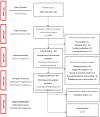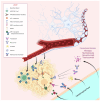Current Evidence in the Systemic Treatment of Brain Metastases from Breast Cancer and Future Perspectives on New Drugs, Combinations and Administration Routes: A Narrative Review
- PMID: 39766062
- PMCID: PMC11675070
- DOI: 10.3390/cancers16244164
Current Evidence in the Systemic Treatment of Brain Metastases from Breast Cancer and Future Perspectives on New Drugs, Combinations and Administration Routes: A Narrative Review
Abstract
Breast cancer is the most frequently diagnosed neoplasm all over the world and the second leading cause of cancer death in women. Breast cancer prognosis has significantly improved in the last years due to the advent of novel therapeutic options, both in the early and in advanced stages. However, the spread of the disease to the brain, accounting for 15-30% of the metastatic diagnoses, is challenging, and its poor prognosis represents an unmet medical need, leading to deterioration of quality of life and causing morbidity and mortality. Generally, triple-negative and HER2-positive breast cancer subtypes more frequently spread to the brain or in the leptomeningeal space. Consequently, according to international guidelines, several systemic treatments can be offered as a first option in some subsets of patients. However, a multidisciplinary approach is recommended to offer the most appropriate strategy to patients. Antibody-drug conjugates such as trastuzumab deruxtecan or sacituzumab govitecan along with small molecules have led to important achievements in the treatment of brain metastases from HER2-positive and triple-negative breast cancer. In this narrative review, we will focus on the molecular features leading to the development of brain metastases and explore the risk and the prognostic factors involved in the development of brain metastases. Finally, we will review the major achievements in the treatment landscape of brain metastases from breast cancer and novel medical approaches.
Keywords: brain metastases; breast cancer; systemic treatment.
Conflict of interest statement
The authors declare no conflicts of interest.
Figures
References
-
- Gori S., Rimondini S., De Angelis V., Colozza M., Bisagni G., Moretti G., Sidoni A., Basurto C., Aristei C., Anastasi P., et al. Central nervous system metastases in HER-2 positive metastatic breast cancer patients treated with trastuzumab: Incidence, survival, and risk factors. Oncologist. 2007;12:766–773. doi: 10.1634/theoncologist.12-7-766. - DOI - PubMed
-
- Clayton A.J., Danson S., Jolly S., Ryder W.D.J., Burt P.A., Stewart A.L., Wilkinson P.M., Welch R.S., Magee B., Wilson G., et al. Incidence of cerebral metastases in patients treated with trastuzumab for metastatic breast cancer. Br. J. Cancer. 2004;91:639–643. doi: 10.1038/sj.bjc.6601970. - DOI - PMC - PubMed
-
- Brufsky A.M., Mayer M., Rugo H.S., Kaufman P.A., Tan-Chiu E., Tripathy D., Tudor I.C., Wang L.I., Brammer M.G., Shing M., et al. Central nervous system metastases in patients with HER2-positive metastatic breast cancer: Incidence treatment survival in patients from registHER. Clin. Cancer Res. 2011;17:4834–4843. doi: 10.1158/1078-0432.CCR-10-2962. - DOI - PubMed
Publication types
Grants and funding
LinkOut - more resources
Full Text Sources
Medical
Research Materials
Miscellaneous



